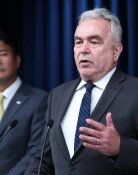NPS's fund committee should stop catering to stock investors
NPS's fund committee should stop catering to stock investors
Posted March. 27, 2021 07:18,
Updated March. 27, 2021 07:18
The pension fund committee or the highest decision-making body of South Korea's National Pension Service (NPS) on Friday agreed to invest more in the domestic stock market in its portfolio, allowing the NPS to purchase more shares of South Korean businesses. In response, “Donghak Ants,” a coined word for individual investors flocking to the domestic stock market, greeted the decision as they see the NPS as a blocking stone to a booming stock market due to its selling spree day after day. However, the NPS stands to come under fire for pandering to popularity.
South Korea's national pension management body adjusts asset percentages in its investment mix every May and meets the targets before a year-end point. Last year, it set the proportion of domestic stocks at 14.8 to 18.8 percent. However, as the stock market picked up, domestic stocks ended up increasing to 21.2 percent out of the NPS' operating capital of 833 trillion won around the end of last year, which led the organization to sell 15 trillion won's stocks so far this year. Added to this, it was about to sell an additional bunch of stocks worth 10 trillion won. Nevertheless, the fund committee's meeting expanded domestic stocks’ range to 13.3 to 20.3 percent, allowing room for an additional purchase of stocks worth 11 trillion won.
Individual investors have expressed their complaints and dissatisfaction with the NPS for holding back the domestic stock market via national petitions to South Korean presidential office Cheong Wa Dae. Even amid market discontent, it brought forward a fund committee meeting by two months to make an adjustment to its investment mix. The decision made runs counter to the NPS-designed mid-term asset allocation plan based on which it will decrease domestic stocks to 15 percent while allowing foreign stocks to account for 30% by the year 2023. "The decision has been made according to market trends,” said the NPS. However, only a few may buy its excuse. That is partly because the fund committee pushed back the resumption of short selling under the pressure of political leaders and the Donghak Ants. Originally scheduled in March, it was postponed to May – after the April 7 by-elections.
To be sure, there are growing voices that the NPS is supposed to increase investment in the domestic stock market when South Korean companies are performing well across the globe in promising industries such as semiconductors and EV batteries. Having said that, misunderstandings can be invited by its decision made without public consensus to increase the ratio of domestic stocks right before the by-elections. In a situation where it has to sell its assets around 2030 to pay for citizens due to the consequences of low birthrates and population aging, the higher ratio of domestic stocks will turn into a catalyst for nosediving stock prices.
It is South Korean citizens who have ownership of national pensions. They only assign a part of their income to the NPS so that it can keep it under management until they retire. The main focus of the NPS should be to increase long-term profits to pay pensions seamlessly and make pension depletion, which is expected to occur in 2055, become a reality as late as possible.
Headline News
- Med professors announce intention to leave hospitals starting Thursday
- Bridge honoring Sgt. Moon Jae-sik unveiled in Pennsylvania
- Chief of Staff Chung tells presidential secretaries to stay away from politics
- US FTC bans noncompete agreements
- N. Korea launches cyberattacks on S. Korea's defense companies







